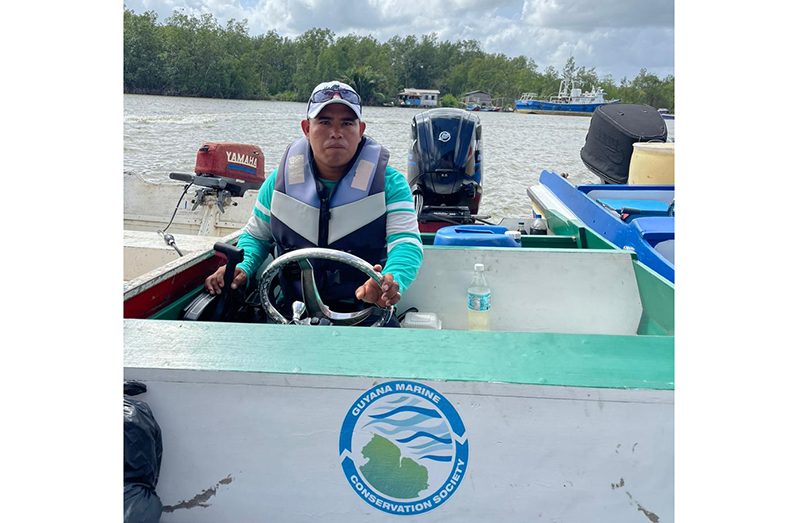BEFORE gaining employment with the Imbotero Research Centre (IRC) as a trained Forest Ranger and Tour Guide, Mark Sam had a very hard life of travelling long distances to the swamp to cut wild cabbage to sell to the factory at the head of the Barima River.
The 31-year-old is a local of the remote village of Imbotero, North West District, Region One (Barima-Waini) and he is very familiar with the area. As such, he is the perfect tour guide for visitors, especially researchers, who usually visit the IRC monthly.
Sam, a father of three, told the Pepperpot Magazine that, in the far-fetched community of Imbotero, there are hardly any permanent jobs or anything showy there except for nature and the traditional work of farming, fishing, crab-catching and hunting.
He added that since becoming a boat captain for the IRC, he has gained a lot of training and feels motivated to learn even more. He also has an important job, which he takes seriously. Sam reported that when researchers visit, he takes them around the mangrove forest to identify trees and animals, and he is responsible for monitoring the mangrove ecosystem regularly to ensure it is all intact.
He pointed out that he has spent all his life in Imbotero Village, a riverine community and border area, and also went to school there. He has no desire to relocate since he is accustomed to the simple way of life there.
Sam stated that he is in the process of upgrading his house and he is doing it in stages since he is not a high-income earner with a steady job.
He explained that his previous task of cutting wild cabbage is certainly not easy; from his home he had to travel by boat for an hour and then walk for two hours to get to the swamp.
Sam added that he would cut the wild cabbage, fetch it, and transport it to the factory where it is sold by grade. The wild cabbage is good for consumption and it is processed, canned and shipped for export.
He stated that some locals would be temporarily employed at the factory whenever they have to process the wild cabbage for export. Sam told the Pepperpot Magazine that, apart from that, most people have to farm to earn and they do ground provision, which is sold at Kumaka Market, 45 minutes away via boat on Tuesdays and Saturdays.
He related that life in general is not easy in Imbotero Village, and it is difficult to get jobs, so people do many things to earn a living. Sam disclosed that he would take around people associated with the IRC and the Centre to the Guyana Marine Conservation Society (GMCS) to wherever they need to go to do training, research or any work that is related to the facilities.
He credits his current knowledge to living in the area all his life. As a boy, he visited the mangroves and became very familiar with the surroundings, so it wasn’t difficult to put things in perspective when he was trained.
“I feel very honoured to be able to live and work in my village and being close to home is where I want to be. Working at the IRC is a plus for me and my family and every day I am learning something new and it helps to broaden my scope and also provide opportunities for me to grow,” he said.
Imbotero Research Centre
The Imbotero Research Centre (IRC) is a new field facility designed to accommodate international researchers in biological sciences, environmental studies, and cultural/ethnographic subjects.
It is situated in the Barima-Mora Passage Area (BMPA), the largest intact mangrove ecosystem in Guyana, with good access to the Shell Beach Protected Area, one of the world’s premier nesting places for several species of sea turtles.
It offers comfortable, convenient accommodations to researchers and greatly simplifies the logistics of conducting field research in this environmentally significant region, where accommodations and support services are generally difficult to secure.
Researchers are invited to submit proposals for the use of the Centre to the Guyana Marine Conservation Society (GMCS).




.png)









